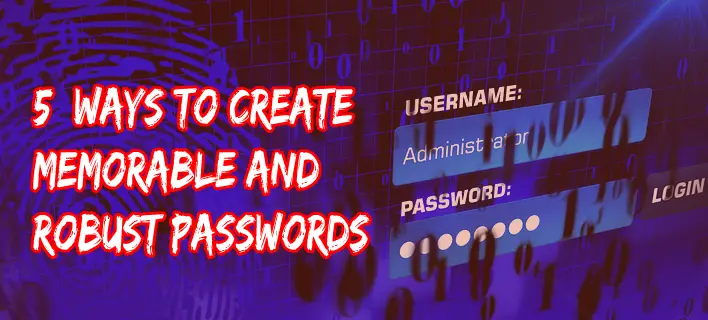Whether obtaining them on the dark web or cracking them by hand, hackers are always out to get your passwords. Therefore, if you don’t design them to be as robust as possible, you make yourself an easy target.
Using a free password manager that has an in-build generator is a preferable way to conjure strong passwords. And it’s less of a weight on your memory. But some people don’t trust software with their passwords. They insist on getting it done the old fashioned way.
There are many awesome tricks on how you can create memorable passwords yourself. But before, let’s take a look at the core hacking methods your passwords must be resilient against.

Defining Robust Passwords
While the “memorable” part of the formula needs no definition (one could also argue it’s a bit subjective), “robust” has a great deal of science behind it.
In other words, when creating a password that stands firm when put against pressure, you want to design in it a way that’s resilient to the most common hacking methods. These include:
-
Dictionary Attacks
By iterating through a pre-set list of words, hackers attempt to guess their way through the most likely possibilities. If a password is a word a person could find in a dictionary, like “cheesecake,” cybercriminals will crack it in a matter of minutes.
The workaround is to design your passwords without relying on dictionary words. Make sure to add some random numbers and symbols to the password if you can’t do without them.
-
Brute Force Attacks
This method resembles a dictionary attack, but it’s much less refined in comparison. It mindlessly checks every possible character combination in a sequence.
So if your password is short, like “car,” it will succumb both to dictionary attacks and brute force attacks. Even something random like “gjP7L” can crumble in the face of brute-forcing because it’s short.
The solution? Keep your passwords long (they should have at least 8 characters).
-
Social Engineering
Compared to the rest, this one is easy. All you have to do is learn how to spot scams and phishing attempts not to give your password away to fraudsters.
Above all else, you need to be cautious. Never forget to question the origin of links and verify the identity of someone who sent you an email containing links or attachments.
When visiting a popular website, like Amazon, never follow a link someone sends to you via email. Look up the site and visit it from the search engine instead.
How to Create a Memorable Password
With this out of the way, let’s move straight to the password generation ideas that will make your life easier in more ways than one.
-
The Sentence Abbreviation Method
First, think of a sentence that isn’t hard to remember. For example, “In high school, my best friend’s name was Sally; she was 16 years old when we first met.”
The password could end up being the following:
ihsmbfnwS;sw16yowwfm
Not only is it long, but it also contains numbers, capital letters, and punctuation marks. Cool trick, right?
To make it work, make sure to use an event from your life that’s easy to recall.
-
The Random Words Method
Dictionary attacks are great at cracking one or two words in conjunction. But they have a harder time cracking passwords that combine 4 or more random terms.
To illustrate an example, it would resemble something along the lines of:
CheesePeanutsLumberjackWillyWonka
If you want to make the password even more resilient, add some random numbers at the end, and that should be enough to do the trick. Long? Check. Easy to remember? Check. Capital letters? Check.
-
The Association Method
What is the first association you get when looking at a website?
Does it use a combination of green and blue colors? It could make most people think of nature (green grass and blue sky).
Of course, constructing passwords like these would be far too obvious to guess. So you should add some variation to them and form something like this:
MeAndMyGrandpaWentFishingAtLakeBodom
The idea behind this method is to capitalize on whatever associations that a specific site triggers in your brain when you visit it. The more unique they are to you personally, the better.
If you have passwords, associating numbers with colors may be second nature to you. Why not transform your unusual gift into something useful?
-
The Muscle Memory Method
This method relies on your muscle memory and finger movement (rather than your actual memory).
For instance, observe the keyboard in front of you and try to target every third vertical column. You’d end up with something like this:
qayrfvujm
To make it a bit more tricky, you could also capitalize every third character and add some random numbers at the end. Something like this would work fine:
QayRfvUjm5910
-
The Personal Agenda Method
No matter who you are, chances are you have a personal agenda of some kind. Let’s assume a dog bit when you were in kindergarten, and you have developed a fear of them as a result. Your password could look like this:
AllDogsMustPerishSoMySoulIsRedeemed
Dark? Sure. But even if you’ve shared your phobia with someone else, there’s no way they’d assume this was your password. And if they do, the chance of them picking the exact same words is close to zero.
Conclusion
Internalizing these tips and tricks can help you craft passwords that are resilient to the most common hacking methods out there.
It might have even inspired you to create a new suitable method that falls within these guidelines. Care to share it?







Lovely post. Personally, I have had one challenge or the other when I try to make strong passwords because I tend to forget them. Unfortunately I don’t get to find where I jotted them down. As for password managers, I am really not comfortable using them.